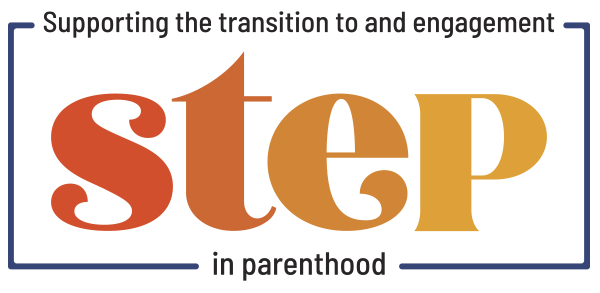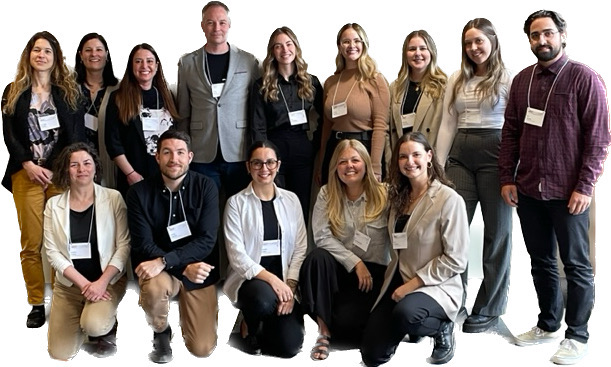Projet STEP
STEP is a psychoeducational and support group intervention offered during pregnancy to individuals having experienced childhood interpersonal trauma. It aims to promote psychological well-being during the perinatal period and support early child development.




Introduction
Context
The STEP program is based on a developmental perspective of coping with difficult life events. Several data demonstrate the protective role played by the ability to make sense of one's life trajectory and to reflect coherently and sympathetically on difficult experiences. This approach has led to the creation of an innovative psychological support and education program, the STEP program.
Project objective
The aim of the project is to offer the STEP program to pregnant women who consider that they have had difficult childhood experiences, and to evaluate its effectiveness. We take this opportunity to better understand how various risk and protective factors contribute to the well-being, health and adaptation of people who have lived through difficult life experiences and are expecting a child. The project also aims to develop adaptations of the STEP program to meet the specific needs of certain target populations.
Development and integration
The STEP program was developed in Québec to respond to the particular needs and issues of expectant mothers who feel they have had difficult experiences in childhood or adolescence, whether or not they have concerns about pregnancy and motherhood.
STEP is a group counseling and psychological education program designed to promote women's psychological well-being during the perinatal period and support their child's development. It consists of eight to nine sessions offered to groups of four to six women.
Preliminary evaluation has shown that the STEP program is sensitive to the issues faced by expectant mothers with difficult experiences, is safe, is appreciated by participants and supports well-being and self-exploration.
Testimonial and benefits
During the nine STEP group meetings, Émilie was able to share her experiences and thoughts with other pregnant women in similar situations. Facilitated by health and social services professionals, these meetings gave her a safe space to share her experiences and fears, as well as to recognize her strengths. She was able to take a sympathetic look at her experience, learn strategies to cope better with stress, and feel better prepared to welcome her child. She appreciated the structured, reflective activities, which still left plenty of room for exchange and experience.
Conclusion and call to action
The STEP program aims to foster a deeper, more serene experience of pregnancy, as well as a better readiness to welcome the unborn child. By supporting people who are expecting a child, the STEP program aims to help create safe and caring environments for generations to come.
We invite you to find out more about the program and discover how you can get involved or contribute by visiting our website, as well as our Facebook and Instagram pages. Together, we can support people expecting a child by offering them a unique opportunity to explore themselves as individuals and as parents, and by providing a "mother-to-mother" collective that fosters the socialization of motherhood, perspective-taking, exchanges and self-validation.
Facebook: www.facebook.com/projetstep.uqtr
Instagram: www.instagram.com/projet.step/
Website: www.projetstep.ca
ASTRA: Training in trauma-sensitive approaches to care and services for expectant mothers

Context
Interpersonal trauma during childhood affects a large part of the population, including those expecting a child and receiving care and services during the perinatal period.
These traumas can have an impact on the experience of expectant mothers, particularly during obstetric care, and eventually on their subsequent relationship with their child. So, to improve the experience and trajectory of parents and their child during this period, and to improve their long-term physical and psychological health, it is necessary to reflect on the care and services offered during the perinatal period with sensitivity to this reality.
Description
ASTRA is a training program for professionals who work with expectant mothers, and who are interested in trauma-sensitive approaches to care and services during pregnancy.
ASTRA is free of charge, and optional continuing education units can be purchased for $25. This asynchronous training course features video vignettes, reflective activities, clinical vignettes, illustrations, readings and downloadable tools.
The training is now available in French as of Fall 2024 and will be released in English in May 2026.
To be notified of the official launch date of the English version, please enter your email address at the following link: https://bit.ly/m/astraperinatal
General training objectives :
- Acquire knowledge about childhood trauma and its consequences;
- Understand how childhood trauma can affect the perinatal experience;
- Know the principles and foundations of trauma-sensitive approaches and understand the rationale contributing to the relevance of their implementation in the context of perinatal care and services;
- Reflect on the ways in which care offered during the perinatal period can be adapted to be sensitive to the traumas experienced during childhood by people expecting a child;
- Know how to deal with traumatic reactions and disclosures, and prevent retraumatization in care and services.
Webpage: www.uqtr.ca/astra
Facebook: https://www.facebook.com/astra.perinatal/
Instagram: https://www.instagram.com/astra.perinatal/
Linkedin: www.linkedin.com/company/astra-perinatal
* Subscribe to our social networks for free content on trauma-sensitive approaches to perinatal care!
ASTRA KH Presents:
Community of Practice members:
Nicolas Berthelot

Nicolas Berthelot received his doctoral degree in clinical psychology from Laval University and completed postdoctoral fellowships at the University of Quebec in Montreal and at the Institut Universitaire en Santé Mentale de Quebec. He is now assistant professor in mental health in the department of Nursing at the University du Quebec in Trois-Rivieres (UQTR). He is also regular researcher at the Centre de recherche interdisciplinaire sur le développement de l’enfant et la famille (CEIDEF) and at the Groupe de recherche et d’intervention en négligence (GRIN) and associate researcher at the Centre de Recherche de l’Institut Universitaire en Santé Mentale de Québec (CRIUSMQ). His current research interests focus on the developmental mechanisms of risk, resilience and psychopathology in the context of childhood trauma and on the intergenerational impacts of child maltreatment. He practices clinical psychology with children, adolescents and adults and aims to integrate research and clinical practice. Nicolas Berthelot collaborates with colleagues from different disciplines in the conception, implementation and evaluation of personalized clinical interventions with survivors of child abuse or neglect in order to prevent a wide array of psychological and physical health problems in this population
Kim Deschenes

Kim Deschênes is a doctoral student in psychology at the Université du Québec à Trois-Rivières and Research Coordinator for the STEP project (Supporting the transition to and engagement in parenthood). Her doctoral thesis focuses on prenatal parental mentalization capacities in parents who have experienced abuse during childhood, and on their child's general and socio-emotional development.
Marie-Ève Grisé Bolduc

Marie-Ève Grisé Bolduc, M.Sc., holds a master's degree in psychoeducation. She is coordinator of knowledge mobilization for the STEP project team and a lecturer in the Department of Psychoeducation and Social Work at the Université du Québec à Trois-Rivières. She is the author or co-author of scientific articles, book chapters and the book "10 questions sur le trauma complexe : Mieux comprendre pour mieux intervenir". Marie-Ève is also a collaborating member of the Canadian Consortium on Child and Youth Trauma and an associate member of McGill University's Centre for Research on Children and Families. She was a youth protection worker for several years, where she developed an interest in trauma-sensitive approaches and complex trauma.
